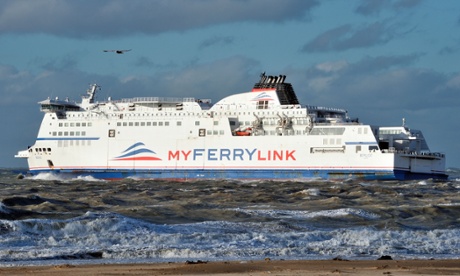
Eurotunnel has announced bumper profits and vowed to emerge stronger from its forced exit from the ferries business, warning that passengers would defect from cross-Channel competitors as green legislation and reduced competition drove up ferry fares.
Group revenues jumped 7% to €1.2bn and operating profits were up 11% to €334m on the back of increasing volumes of traffic though the tunnel during the peak seasons.
The group, whose core business is the Channel tunnel fixed link and its shuttle services, was ordered by the Competition and Markets Authority (CMA) to sell or stop operating MyFerryLink by summer.
Eurotunnel said travellers could face more problems in the summer if there was no quick sale of MyFerryLink. Under the competition watchdog’s ruling, the ferry services, which account for 10% of the cross-Channel market, must end on 9 July if Eurotunnel cannot find a buyer.
Jacques Gounon, Eurotunnel chief executive, described the peak-season deadline as a “quite a joke”. “Even if we identify a purchaser for the business, it needs clearance from the CMA. If you have three ships less during the summer, it’s going to be very difficult; you’ll see the impact of the CMA decision.”
He said there had been four expressions of interest. Eurotunnel hopes to net €120m-€150m from the sale of the business it developed over the past four years with ferries bought from the defunct SeaFrance.
Gounon admitted profits were liable to dip this year with the loss of MyFerryLink but forecast renewed success by 2016. Eurotunnel believes its premium service will become increasingly attractive as ferry companies are forced to push up fares to meet the cost of new regulations on fuel. Environmental directives require Channel ferries to reduce sulphur emissions through investing in additional technology or switching to more expensive fuel.
The group said its outlook was positive given the strength of the pound – 85% of passengers in the tunnel are British, while the majority of freight traffic is for UK imports. Eurotunnel is buying extra freight shuttles to meet increased demand, with 20% more capacity for lorries in the next two years. It will be boosted by increasing revenues from Eurostar, its major customer, which carried 10.4 million passengers in 2014 and plans to expand significantly this year with new, longer trains adding capacity in the tunnel.
Eurostar will also launch direct London-Amsterdam rail services, where it hopes to gain a 30% share of one of Europe’s busiest air routes. Gounon said the British government’s sale of its Eurostar stake underlined the tunnel’s importance: “It shows the transmanche [cross-Channel] has real value.”
Eurotunnel claimed its confidence was underscored by the announcement of a planned 20% higher dividend to shareholders.
Meanwhile, the tunnel operator reiterated warnings that exit passport checks to be introduced by the Home Office over the Easter holidays could cause massive disruption at ports, and tailbacks on the roads around Kent, as well as costing business if vehicles were not able to access shuttle trains on time for departures.
Gounon said he supported the principle behind the move, but wanted the government to help Eurotunnel use technology to speed the process. “We want the government to embrace the proposition of faster borders, using smartphones and trusted-travellers programmes.“

